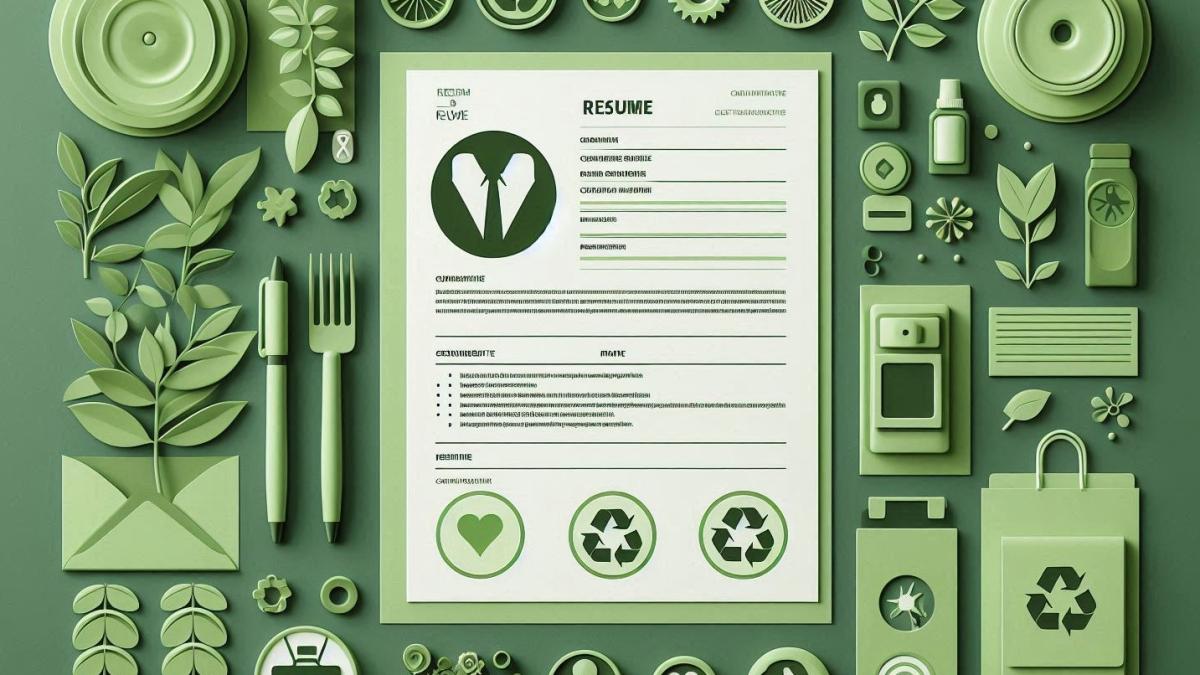
Highlighting Sustainability and Green Skills in your Resume
Oct 19, 2024. By Samona Sarin
In today’s rapidly changing job market, the demand for sustainability-focused roles is on the rise. The shift towards a circular economy—where waste is minimized, resources are reused, and sustainability is prioritized—has created a wealth of opportunities in various sectors. As a job seeker in this green economy, it is crucial to craft a resume that not only highlights your skills but also aligns with the principles of sustainability. This article provides insights and tips on how to create an impactful resume that stands out in the eco-friendly job market.
Understanding the Circular Economy
The circular economy is an innovative model that challenges the traditional linear economy, which follows a 'take-make-dispose' pattern. Instead, the circular economy emphasizes reducing waste, reusing materials, and recycling products to create a sustainable and regenerative system. This shift requires skilled professionals who can contribute to this vision through sustainable practices, innovative solutions, and eco-friendly strategies.
As job seekers pursue opportunities in sustainability and green industries, it’s essential to reflect this understanding in their resumes. Employers in these fields are looking for candidates who not only possess the necessary skills but also demonstrate a commitment to sustainability.
Key Elements of a Green Jobs Resume
When crafting a resume focused on green jobs, there are several key elements to consider:
Tailor Your Resume to the Job Description
Every job is unique, and so should be your resume. Carefully read the job description and identify the specific sustainability skills and experiences required. Use keywords from the posting to make your resume more relevant. Phrases like "circular economy," "sustainability initiatives," "resource management," and "eco-friendly practices" can help your application stand out to applicant tracking systems (ATS) and hiring managers alike.
Highlight Relevant Sustainability Skills
Include a dedicated skills section that emphasizes your sustainability skills. This could include:
- Green Certifications: List any certifications relevant to sustainability, such as LEED, ISO 14001, or Certified Energy Manager (CEM).
- Technical Skills: Proficiency in tools and software related to sustainability analysis, like Life Cycle Assessment (LCA), carbon footprint calculators, or renewable energy technologies.
- Project Management: Experience in managing sustainability projects, including waste reduction initiatives or energy efficiency programs.
- Research and Analysis: Skills in analyzing data related to sustainability metrics, environmental impact assessments, and resource conservation strategies.
Showcase Experience in Sustainable Practices
Your work experience should demonstrate your involvement in sustainability efforts. Use quantifiable achievements to highlight your contributions. For instance:
- Implemented a recycling program that reduced waste by 30% within a year.
- Developed a sustainability training module that educated over 200 employees on eco-friendly practices, resulting in a 25% increase in participation in sustainability initiatives.
Consider using bullet points to make your accomplishments clear and impactful.
Include Volunteering and Extracurricular Activities
Employers in the green sector value candidates who are passionate about sustainability beyond their professional experience. Include any volunteer work or extracurricular activities that showcase your commitment to sustainability, such as:
- Volunteering for local environmental organizations or NGOs.
- Participating in community clean-up events.
- Serving on boards or committees related to sustainability initiatives.
These experiences demonstrate your proactive approach to promoting sustainability and can make your resume more compelling.
Use an Eco-Friendly Design
While content is crucial, the design of your resume should also reflect your focus on sustainability. Consider using eco-friendly design elements, such as:
- Green Tones: Incorporate shades of green to symbolize your commitment to the environment.
- Circular Icons: Utilize circular design elements or icons related to recycling, renewable energy, or nature to visually convey your alignment with circular economy principles.
- Clean Layout: Opt for a clean, organized layout that is easy to read. Avoid excessive graphics that might distract from your qualifications.
6. Add a Summary Statement
A strong summary statement at the beginning of your resume can set the tone for the rest of the document. This section should encapsulate your passion for sustainability and your relevant skills. For example:
“Dedicated environmental professional with over five years of experience in sustainability consulting. Proven track record of implementing circular economy strategies that have reduced waste and improved resource efficiency in various industries. Committed to driving positive environmental change through innovative solutions and collaboration.”
Education and Continuous Learning
Education is vital in the sustainability field. List your degrees and relevant coursework that pertains to sustainability, environmental science, or related fields. Additionally, include any workshops, webinars, or online courses you’ve completed, as continuous learning is crucial in this evolving landscape.
Circular Economy Resume Tips
- Quantify Achievements: Whenever possible, use numbers to quantify your accomplishments. This not only makes your achievements more tangible but also shows potential employers the impact of your work.
- Use Action Verbs: Begin each bullet point with strong action verbs such as "developed," "implemented," "designed," or "analyzed" to convey your contributions effectively.
- Keep It Concise: Aim for a one-page resume unless you have extensive experience. Be concise and focus on the most relevant information.
- Proofread: Ensure your resume is free of grammatical errors and typos. A polished resume reflects your attention to detail—an essential trait in sustainability roles.
Conclusion
As the demand for sustainability-focused jobs continues to grow, crafting a compelling resume that highlights your green skills and experiences is more important than ever. By tailoring your resume to emphasize sustainability, the circular economy, and your commitment to eco-friendly practices, you can position yourself as a strong candidate in this competitive job market. Remember to showcase your achievements, use an eco-friendly design, and continually update your skills to align with the evolving landscape of green jobs. With these strategies, you’ll be well on your way to landing a role that not only advances your career but also contributes to a more sustainable future.





ADD COMMENTS
Your email address will not be published. Required fields are marked *